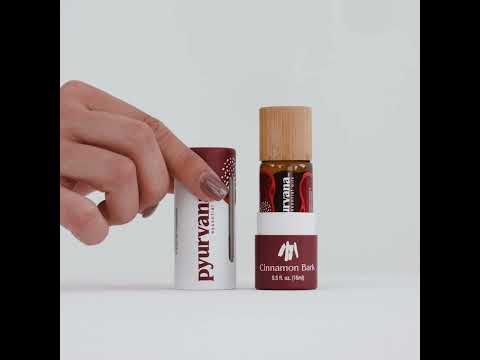Cinnamon Oil (Bark) – 15ml
Cinnamon Oil (Bark) – 15ml
Couldn't load pickup availability
Cinnamon oil has an immediately recognizable scent that is warm, comforting, and nostalgic. It is often associated with winter and the holiday season, but it is delightful to diffuse year-round. This variety is distilled from the bark, which gives it a stronger aroma.
More Information


What is Cinnamon Oil?
Cinnamon oil can be distilled from parts of many different types of trees from the Cinnamomum genus, which includes over 300 different species. All of these are evergreen and have aromatic bark and leaves. This essential oil comes from Cinnamomum zeylanicum trees grown in Sri Lanka.
The spice cinnamon is obtained from the bark of Cinnamomum trees and has been around for ages. Historians estimate that this spice was first used by the Ancient Egyptians as early as 2000 BC. During the spice trade, its source was kept a secret to increase its value. Different societies throughout history have used it for incense, perfumes, and in recipes. It is often associated today with baking.
There are two different types of cinnamon oil: cinnamon bark essential oil and cinnamon leaf essential oil. The difference is which part of the plant is used. Cinnamon bark is generally the stronger-smelling of the two as it contains a higher concentration of cinnamaldehyde. We also offer cinnamon leaf oil and both are extracted using steam distillation. This involves injecting steam into a large container filled with cinnamon bark, which turns the scent compounds in the plant into a vapor. This is then condensed, collected, and purified.
Complementary Scents
Cinnamon essential oil pairs well with other spicy scents, especially clove. It also creates a lovely blend with citrus essential oils including grapefruit, orange, lemon, and bergamot. When combined with peppermint, it creates an invigorating winter blend.
Primary Benefits
Cinnamon oil may improve the look and feel of your skin. Many people have found it helps nourish dry skin. Like any pure essential oil, you should always dilute cinnamon oil with a carrier oil before applying it topically. Cinnamon is especially strong, so it is also a good idea to test it on a small area before using a larger amount.
This essential oil also works as a natural lip plumper, which can give you a gorgeous pout. To create your own plumper, mix one or two drops of cinnamon oil with coconut oil, shea butter, or cocoa butter.
Diffusing cinnamon oil can give your home an uplifting and inviting scent. Many people find that it lifts their mood and energizes them. This is especially true if you have fond memories of baking with cinnamon or other positive associations with the aroma. The fragrance may also act as a natural aphrodisiac.
How to Use Cinnamon Essential Oil
To diffuse our cinnamon bark essential oil, simply add a few drops to your preferred diffuser. You can do this with cinnamon alone or you can mix it with other scents. Be sure not to add too much, as this may result in an overpowering fragrance. You can also create a room spray using cinnamon oil, witch hazel, and water. Be sure to shake the spray bottle well before using.
If you use cinnamon oil topically, always dilute it with a carrier oil. These include coconut oil, olive oil, jojoba oil, and more. We recommend using three drops of essential oil per teaspoon of carrier oil, although starting with a lower concentration may be a good idea if you have sensitive skin. If you notice any adverse reactions, you should stop using the oil and consult your doctor.
Cautions
While all pure essential oils must be diluted before use, cinnamon oil is particularly strong and its chemical compounds can burn your skin if you do not use a carrier oil. In addition to this precaution, you should also avoid sensitive areas such as your ears, nose, or skin around your eyes. Do not add cinnamon essential oil to your bath. Since the oil will not mix with your bath water, it can collect in beads on the surface. If these come into direct contact with your skin, they may cause burns or rashes. Always exercise caution and speak with your doctor if you have any concerns.
Keep out of reach of children.
If you are pregnant, nursing, or under the care of a physician, consult your health care provider before using cinnamon or any other essential oil.
This essential oil is for external use only and should not be ingested.
Pure essential oils are flammable and should be stored in a cool, dry location away from any open flames or excess heat.
Its a Best Product
What's Trending
-
 50%
50%
OFFBergamot Oil – 15ml
Regular price $11.50Regular priceUnit price / per$23.00Sale price $11.50Sale -
 50%
50%
OFFCinnamon Oil (Bark) – 15ml
Regular price $10.00Regular priceUnit price / per$20.00Sale price $10.00Sale -
 50%
50%
OFFCinnamon Oil (Leaf) – 15ml
Regular price $12.00Regular priceUnit price / per$24.00Sale price $12.00Sale -
 50%
50%
OFFCitronella Oil – 15ml
Regular price $7.50Regular priceUnit price / per$15.00Sale price $7.50Sale -
 50%
50%
OFFClary Sage Oil – 15ml
Regular price $15.00Regular priceUnit price / per$30.00Sale price $15.00Sale










